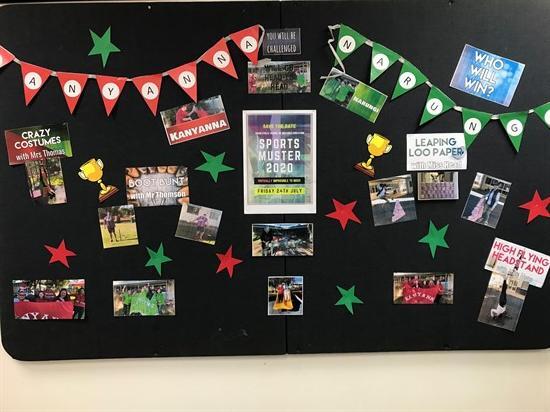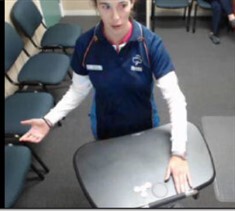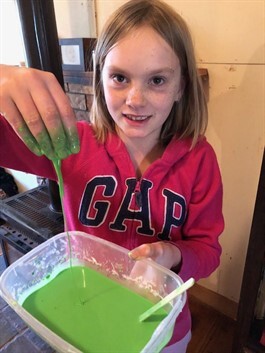June 2020
Newsletter Articles
Principal’s Ponderings
As we say goodbye to the longest term ever…we look forward to another quiet term that will hopefully blossom into opportunities for our students to get together while still keeping within the restrictions imposed.
Field events Term 3: While sporting activities are starting again in term three, the overarching guidelines of no more than 100 people together (including students, parents, visitors and staff) restricts us from a Sports Muster. Fitting in dates later in term has proven to be difficult. Sadly, there will be no Sports Muster this year.
Our staff have done a wonderful job of preparing for the Virtual Sports Muster and Arts and Craft competition. Please share the Facebook posts of instructional videos with your students.
Other activities that will be fewer numbers as the restrictions lift, such as Cluster Musters and perhaps a Year 3-6 camp are possible if we ensure COVID-19 plans are in place at possible venues. The restrictions, numbers and other considerations will hopefully allow for these to be held in the latter half of Term 3.
School Opinion Survey: This year’s survey is short and takes only a few minutes to complete. Please encourage your students in years 4-10 to complete the survey:
- Student survey –
Click%20here%20to%20do%20the%20Student%20Survey%20Online
And, Parents:
- Parent survey –
https://survey.qed.qld.gov.au/form/Parents-HaveYourSay.aspx
Some key points for the School Opinion Surveys:
- The surveys will be open until the end of week 1 in Term 3 (Friday 17 July).
- Each of these surveys are expected to take less than 5 minutes to complete.
- The surveys will provide an opportunity for reflection on schools’ and the department’s response to COVID-19 and an opportunity for us to reflect and provide feedback to the system to inform future policy.
- The survey form has been designed so that it can easily be completed on a smartphone. If required, paper-based copies can be requested from the School.
Farewell:
I would like to farewell Cameron Delforce as he leaves this term to start at a new school in Term3. Thank you Cameron for your leadership and contributions to our school over the years you have been with us. We wish every success and fun at your new school and look forward to catching up around the traps.
Thank you
A special thank you to all staff, parents and students for the super effort this term. The report cards are on their way to students, the plans for next term are in place and the holidays are upon us.
Have a wonderful break,
Jenny
From the Deputy’s Desk
Student Leadership and Assembly
Student Leaders have been participating in student leadership sessions on a Friday with me. These sessions are focussing on a leadership model that extends their current skills and equips students to take the lead in a variety of settings within our school. A focus this term has been for the students to share their ideas of Virtual Sports Muster. The Leaders have continued to host assembly each week. We encourage families to dial in each Tuesday morning to hear the weekly notices and to participate in the celebration of student work and achievement.
Farewell and Good Luck to Cameron Delforce – 2020 Narungi House Captain

Sports Muster and Arts and Crafts Competition
Virtual Sports Muster and Arts and Crafts competition will take place next term, Friday 24th July. This year’s theme is Mother Nature’s Power. Please download the handbook for all the important information for each category.

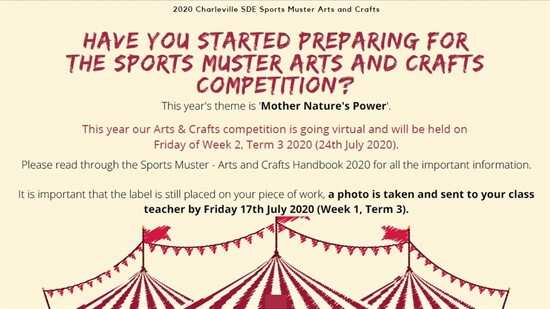
Have a wonderful break everyone
Cheers
Katrina Dunne
Primary and Secondary HOD | Teaching and Learning
Rickie Itzstein and Mandy McDonald
Teacher Professional Learning

Performance and Development Plan
This semester our teachers were involved in reviewing our Performance and Development Plan. Through collaboration and feedback we established a process that allows teachers time to reflect on their own professional goals whilst giving them time to work with appropriate members of staff (not just at CSDE but also in the department). This plan was created in response to CSDE’s 2019 School Opinion Survey and teacher feedback on our Annual Performance Review.
The leadership team have been able to work closely with all teaching staff to understand their professional aspirations and support teachers to build capacity. Through this process, we have also been able to strengthen our professional relationships with the team at Roma Centre of Learning and Wellbeing (CLaW), cluster schools and Western Queensland Distance Education schools.
Policy and Framework Updates

Prep – Year 10 Reading Framework
Rhona Ellis (Head of Learning – Reading) and Raelinda Allwood (Head of Learning – Secondary) from the CLaW will be working with the HODs and some Diverse Learning Team teachers to review and update our current Reading Framework to ensure we encompass a whole school approach to developing reading outcomes. We will use the School Improvement Hierarchy as a guide to create a one-page Reading Framework with an accompanying policy document.
Through the initial review process, we have identified the need for a Secondary Literacy Intervention teacher. Rebecca Washbrook will analyse student data to identify students reading below benchmark and conduct small group tutorials for these students to enhance their literacy skills.

Curriculum, Assessment and Reporting Plan (CARP)
A school’s P-10 Curriculum, Reporting and Assessment Plan (CARP), in alignment with the
P-12 Curriculum, Assessment and Reporting Framework, (P-12 CARF), consists of the following aspects to achieve the goals of improved student outcomes:
- Curriculum Plan
- Assessment Schedule
- Reporting Plan
- Whole School Approach to Moderation
- Whole School Approach to Differentiation
- Student Health and Wellbeing
To ensure schools across the DDSW are creating effective CARPs, the CLaW will be conducting ten professional development sessions/modules. Our leadership team will be participating in these sessions starting week eight of this term. Through participation in this online learning we will produce a context appropriate CARP that encompasses the great work our staff are currently doing.

Pedagogical Framework
As we transition to Blackboard Ultra, our Pedagogical Framework has become a point of focus. Moving forward, we will collaborate during staff meetings regarding current practice and any adjustments required.
PLO Prattle
How our lives have changed in the blink of an eye. We have all seen changes in what, how and when we now do things. Term 2 and 3 are normally quite busy with field events, but as you all know this hasn’t and isn’t happening. However the positive side of things is being able to do virtual activities within our school.
One positive outcome for this term for my family has been the arrival of our 1st Grandson William on the 2nd June.
Below is Michael Grose’s article about raising resilient problem solvers. As busy parents we often ‘just do it or give the answer’. Michael gives some strategies around making our children more independent.
Raising resilient problem solvers by Michael Grose
Personal problem-solving is an under-rated skill shared by resilient children and adults. First, identified alongside independence, social connection and optimism by early resilience-researchers in the US, the ability to solve your own problems is the basis of a child’s autonomy and self-efficacy.
When parents solve all children’s problems we not only increase their dependency on adults, we also teach kids to be afraid of making mistakes and to blame themselves for not being good enough. As I noted in my book Anxious Kids, this is fertile ground for anxiousness and depressive illness.
So how can we raise kids to be courageous problem-solvers rather than self-critical, low risk-takers? Here are six practical ideas to get you started:
Turn requests for help into problems for kids to solve
Kids get used to bringing their problems to parents to solve. If you keep solving them, they’ll keep bringing them. “Mum, Sarah’s annoying me” “Dad, can you ask my teacher to pick me for the team?” “Hey, I can’t find my socks!” It’s tempting if you are in a time-poor family to simply jump in and help kids out. Alternatively, you can take a problem-solving approach, cuing them to resolve their own problems and take responsibility for their concerns. “What can you do to make her stop annoying you?” “What’s the best approach to take with your teacher?” “Socks, smocks! Where might they be?”
Ask good questions to prompt problem-solving
A problem-solving approach relies on asking good questions, which can be challenging if you are used to solving your child’s problems. The first question when a child brings you a problem should be: “Can you handle this on your own?” Next should be, “What do you want me to do to help you solve the problem?” These questions are not meant to deter children from coming to you. Rather to encourage and teach them to start working through their own concerns themselves.
Coach them through problems and concerns
Imagine your child feels they were unfairly left out of a school sports team by a teacher and asks you get involved. The easiest solution may be to meet with the teacher and find out what’s going on. You may or not resolve the problem but in doing so you are teaching a child to become dependent on you. Alternatively, you could coach your child to speak to the teacher themself and find out why they were left out. Obviously, there are times when children need their parents to be advocates for them such as when they are being bullied, but we need to make the most of the opportunities for children to speak for themselves. Better to help your children find the right words to use and discuss the best way to approach another person when they have problems. These are great skills to take into adulthood.
Prepare kids for problems and contingencies
You may coach your child to be independent – walk to school, spend some time alone at home (when old enough), catch a train with friends – but do they know what to do in an emergency? What happens if they come home after school and the house is locked? Who do they go to? Discuss different scenarios with children whenever they enter new or potentially risky situations so that they won’t fall apart when things don’t go their way. Remember, the Boy Scouts motto – “”Be Prepared!
Show a little faith
Sometimes you’ve got to show faith in children. We can easily trip them up with our negative expectations such as saying “Don’t spill it!” to a child who is carrying a glass filled with water. Of course, your child doesn’t want to spill it but you’ve just conveyed your expectations with that statement. We need to be careful that we don’t sabotage children’s efforts to be independent problem-solvers with comments such as, “Now don’t stuff it up!”, “You’ll be okay, won’t you?” , “You’re not very good at looking after yourself!”
Applaud mistakes and stuff ups
Would a child who accidentally breaks a plate in your family while emptying the dishwasher be met with a ‘that’s really annoying, you can be clumsy sometimes’ response or a ‘it doesn’t matter, thanks for your help’ type of response? Hopefully it won’t be the first response, because nothing shuts down a child’s natural tendencies to extend themselves quicker than an adult who can’t abide mistakes. If you have a low risk-taking, perfectionist child, consider throwing a little party rather than making a fuss when they make errors so they can learn that mistakes don’t reflect on them personally, and that the sun will still shine even if they break a plate, tell a joke that falls flat or doesn’t get a perfect exam score.
As I’ve often said your job as a parent is to make yourself redundant (which is different to being irrelevant) at the earliest possible age. The ability to sort and solve your own problems, rather than step back and expect others to resolve them, is usually developed in childhood. With repetition and practice problem-solving becomes a valuable life-pattern, to be used in the workplace, in the community and in family relationships.
Enjoy a well-earned break and keep safe and warm.
Cheers
Helen Cook
Parent Liaison Officer
Digital Discoveries

iPad App of the Month: Tiny Scanner
Tiny Scanner is an app (for both Apple and Android) that turns your phone or iPad into a scanner! Scan pages of school work, documents, photos, receipts, or just about anything.
Batch mode combines multiple scans into a single PDF that you can send to the teacher by email or by wifi or direct connection to your computer.
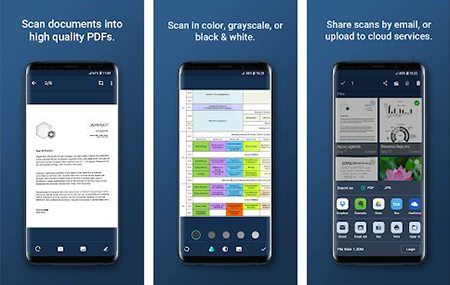
Download from the link below:
https://itunes.apple.com/au/app/tiny-scanner-pdf-scanner-to-scan-document-receipt-fax/id595563753?mt=8
Term 3 – Switching to Blackboard Collaborate Ultra
Next term will see how school officially switch our learning platform to Blackboard Collaborate Ultra. Our eLearn courses will have the ‘On-air Lessons’ button changed to link directly to Ultra with removal of the original links. The ‘New On-air Lessons’ will also be removed. Families are reminded that Google Chrome is the preferred browser to use to access Ultra.

Tech Girls Workshop
Girls aged 10 to 18 are invited to register for a free online workshop with Jacqueline Tait on 5th August. If interested, email Mrs O on sowcz1@eq.edu.au by 17th July to secure a place.

Student Newsletter
Students are encouraged to submit work samples, stories and photos to the student newsletter – share your school and your life with other students in our school.

From the Technician’s Table: Need More Help?
If you are having trouble with log on details, access problems, computer or headset issues or just want some advice we are here to help you. . .
School Technician – Bill Grant: wjgra0@eq.edu.au or 07 4656 8909
For all phone and headset issues and problems with computers.
Digital Learning Facilitator – Sam Owczarek: sowcz1@eq.edu.au or 07 4656 8915
For advice or help with using programs or tools on the Learning Place (including eLearn, Student Space and Blogging).
Give us a call or send an email.
Girl Guides

Getting Hands On at Guides . . .
Girl Guides from the 2nd Charleville Lones Unit have been working through their ‘Hands’ badge conquering a range of challenges they developed to do with their hands. The Guides have loved taking on the challenges they chose and achieving new things.
|
Magic Tricks with Galah |
Learning the Cup Song |
|
|
|
Making slime with Parakeet
Email Mrs Sam O on sowcz1@eq.edu.au if you would like to join our fabulous Girl Guide unit and application forms and information will be forwarded to you.
Yr 8 Food and Fibre Technology
The Yr 8 Food and Fibre Technology students have been analysing how food and fibre are produced when designing managed environments and how these can become more sustainable. They have applied design thinking to design a sustainable food production environment to address a need or opportunity. Here are some of the designs and gardens they created.
Art Club
Student Newsletter
Please click on the following link to view the latest Student Newsletter
https://spark.adobe.com/page/H7iHHtAyQDG5v/
Virtual Sports Muster
